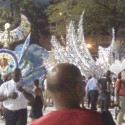A chat with poet Dane Swan
By Adebe DeRango-Adem
Dane Swan is a poet and spoken-word performer living in Toronto. He has been featured in more than a dozen North American cities and competed in numerous poetry slams, including the Canadian Festival of Spoken Word (placing 2nd with Team Toronto) and the Rust Belt Regional Slam (placing 3rd with Team Toronto). His poetry can be found in the pages of Rampike, Misunderstandings and Vallum magazines, as well as in anthologies and on various CD projects.
When did you first discover the power of words? Did you write as a child?
Ever since I can remember words have always had an immense power. I wrote a lot of stories and poems as a kid. In all honesty, high school turned me off of traditional creative writing. I ended up keeping my writing skills sharp writing raps and dancehall lyrics as a teenager.
What initially prompted you to write your poetry chapbook, Narcotics//Flora?
I’m proudly a member of Canada’s spoken-word poetry community. Unfortunately, some members of the literary community have created fictional stereotypes of the poetry that spoken-word poets, particularly slam poets, are capable of writing. At the time I wrote Narcotics // Flora, the anti spoken-word rhetoric was at its loudest. I wanted to quietly make a point—that a slam poet could write eloquent, tight and structured poetry while keeping on message.
Your book is described as a collection based on transit and the aesthetics of the city; it features poetry that is literally in motion. What is it about the transience of urban space that attracts you as a writer? I think moving and motion is life. Breathing is movement. We are never still. That goes for immigrants as well; they are constantly moving, searching for a place to call home. Cities can be described as living organisms.
You are known predominately in Toronto as a spoken-word artist, though your style lends itself to a variety of traditions. How do you see the role of spoken word/oral traditions writing within the larger project of recognizing, preserving and promoting the contributions of Black peoples and their collective histories?
The word is everything. Poetry and all storytelling traditions were born of oral tradition. The printing press is merely an extension of these traditions, not a replacement. That’s why books are printed in English, French, etc. If books were the domain of the elite they would only be written in Latin. As for Black History, it’s not enough for us to mimic the traditions of our forefathers. As a community we have to carry oral traditions and the history behind them. Gospel music, spoken-word, storytelling, and even rap are linked together in many ways. It is part of our larger project to understand how and why.
You were born in Bermuda. How has the experience of moving from Bermuda to Canada factored into your work?
I was born and raised in Bermuda but my mother is Jamaican. Until my grandpa died when I was 10, we spent our summers, Christmases and some Easters in the small village of Yallas. We also spent time in Lands End and Kingston. Bermuda and Jamaica are similar in a number of ways: friendly populations, black majorities, island culture. The biggest difference was the economic situation. Spending time between those two islands was really humbling. When I first moved to Canada, I was excited that my mother’s culture was so pronounced, but I was also upset at how much Jamaican culture was commodified. I remember going into Jamaican restaurants and asking for things every Jamaican should know and getting blank stares. They didn’t know what sorrel was. I could take the cold but a disregard of my mother’s culture was most difficult. It did show me that there is a truth and then an image held up as the truth. My goal as a writer has always been to show an honest, unbiased reality. I guess seeing discrepancies in how my mother’s culture was portrayed here influenced that in my writing.
Do you see Black Canadian writers who identify with a Diaspora as more apt to use their craft to cross multiple barriers aesthetically or culturally?
It’s tough to say whether being identified with a particular Diaspora (Bermudian) allows me to cross barriers that other Black Canadian writers cannot. I assume so. I have a pretty varied life experience, but the truth is we don’t know what the young Black Canadian writer’s voice is. There have been Black people in Canada since before it was called Canada, but Black children are often informed otherwise. There is at least a generation of Black Canadians who don’t know what they are, or are uncomfortable in their skin because they are trying to fit into a mould that doesn’t exist. Hopefully one day those voices will rise.
You and fellow Toronto poet Dan D’Onorio (aka Soulfistikato) founded Soul Jah Ras Productions to promote spoken word and slam poetry in Toronto over the last several years, and have been the tireless hosts of the Toronto $100 Slam, now nearing the end of its series. How has the experience of hosting the slam inspired the course of your writing career?
Hosting anything will challenge you. We started $100 Slam because we didn’t think there were enough stages in Toronto for spoken word. We also felt that spoken-word artists could learn something from their literary brethren. Now there are tons of stages. A number of literary poets interact with spoken word artists and vice versa. We like to think we helped forge some of those changes in the local community.
How would you describe your working style, or optimal environment for writing?
I can write anywhere. Sometimes I write notes on my cell phone in nightclubs. I would never let something like comfort get in the way of a good poem. The optimum environment is wherever I’m inspired and can write without getting wet or run over.
What are you reading right now? I just finished Austin Clarke’s In This City. Right now I’m struggling with a translation of The Egyptian Book of The Dead. After that I have The Frog Lake Reader, Things Fall Apart… as you know, if you decide to be a writer, reading becomes part of the job.
What author in history would you have loved to have a coffee (or tea) and chat with, and why?
Langston Hughes. He is one of the few Black American writers who comfortably talks about the struggles of race yet never makes guilt part of the price to read his work. Genius is an understatement.
Finally, are you currently at work with any new projects? Where can we go to hear or find your work?
My first full-length book, Bending the Continuum, is slated for a May launch with Guernica Editions. Also, Dan and I have a blog: www.souljahras.wordpress.com. I try to post all events either one of us are involved with there.








[...] This post was mentioned on Twitter by Dane Swan, SWAY Magazine. SWAY Magazine said: Sway chats with poet Dane Swan http://t.co/GOpsjcD via @swaymag [...]
Leave your response!